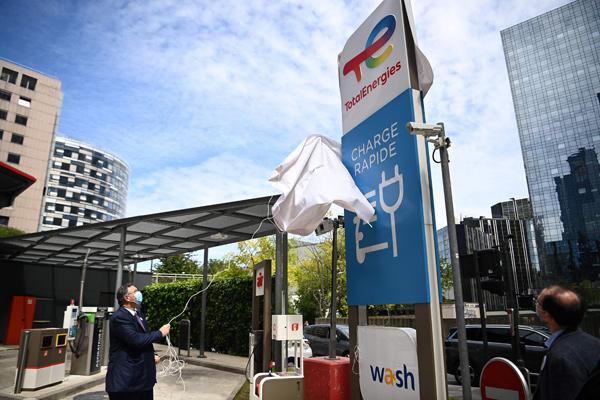- Mix
- Sun-2021-05-30 | 02:14 pm

Nayrouz News Agency :
French oil and gas major Total on Friday won near-unanimous shareholder support for its climate strategy along with a new name, TotalEnergies, marking its shift — but NGOs dismissed it as "bogus".
Only a tiny minority rebelled against the company's plans at a shareholders' meeting, saying they fell short of what was needed to fight global warming.
Management's non-binding resolution, which followed similar moves at energy peers Chevron, ExxonMobil and Shell, secured 91.88 per cent backing at the assembly.
Total's pledges include reaching net-zero emissions in its global businesses by 2050, as well as for all its customers in Europe.
It also won 99-per cent support for a motion to change its name to TotalEnergies as the company wants to show that it is diversifying into renewable energies, which will account for 20 per cent of investments this year.
Shareholders had recognised "a true and sincere transformation process" and had backed "an audacious and demanding strategy", said Chairman Patrick Pouyanne, who also won approval for a renewed term for himself at the helm of the company.
The new name, he said, "marks our collective desire to create a new Total, a multienergy company and major actor in energy transition", Pouyanne said as he unveiled the new, multicolour logo.
'Climate chaos'
NGOs and other investors were disappointed, having announced ahead of the assembly that they hoped 15 per cent of shareholders would call out management on their targets seen as too modest.
In a joint statement, Reclaim Finance and Greenpeace France cheered shareholders who opposed "the 'bogus' climate plan, while furiously condemning the large majority who backed Total's plan for increased fossil fuel extraction".
"By supporting Total's greenwashed strategy, shareholders have voted willingly for climate chaos," said Reclaim Finance founder Lucie Pinson.
In the run-up to the gathering, asset management firm Meeschaert AM had urged Total to refrain from any new drilling for oil and gas, echoing an appeal by the International Energy Agency to all energy giants.
Pouyanne rejected the call on Friday, saying "radical solutions are not the answer" and reminding his audience that "80 per cent of our economy runs on fossil fuels".
Dutch fund ACTIAM meanwhile said that Total's emissions strategy "falls short as it remains unclear how it will meet its goals given its current pace of fossil fuel production and investments that still significantly outpace those in renewables".
Meeschaert Asset Management, which also voted against the plan, said other shareholders had voiced their opposition by abstaining from the vote, though the number was not immediately known.
Eleven investors at last year's meeting put forward a motion for more ambitious climate targets — prompting Pouyanne to remark on "those who act like activists, not like shareholders" — but still won nearly 17 per cent in a vote at the time.
In the United States, investors put pressure on two oil giants to do better on climate change, installing activist board members at ExxonMobil and directing Chevron to deepen emissions cuts.
Shell, meanwhile, was ordered by a Dutch court this week to slash its greenhouse gas emissions by 45 per cent by 2030.
Last week, Shell shareholders backed a controversial climate strategy to reduce reliance on fossil fuels and become carbon neutral by 2050.
Another resolution, put forward by the environmental organisation Follow This, which called on Shell to set more ambitious targets, was supported by just over 30 per cent.
-
 Will Trump end up like Kennedy?2026-02-03
Will Trump end up like Kennedy?2026-02-03








